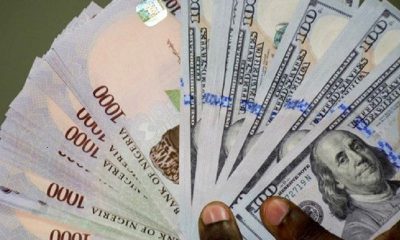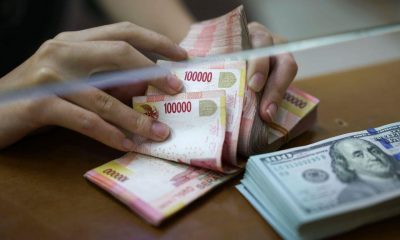Economy
Impact of Nigeria-South Africa Trade on NGN and ZAR Exchange Rates

Nigeria and South Africa are two of the largest economies in Africa. Their trade interactions hold a significant influence on the continent’s economic landscape. Notably, their bilateral trade relationship greatly impacts their respective currencies, the Nigerian Naira (NGN) and the South African Rand (ZAR). In this article, we will explore the impact of the Nigeria-South Africa trade on the NGN and ZAR exchange rates. Let’s jump in.
A Brief Look at the Trade Relations Between Nigeria and South Africa
Trade between Nigeria and South Africa has evolved significantly over the past few decades. Historically, Nigeria’s economy has been heavily reliant on oil exports, which account for a substantial portion of its GDP and foreign exchange earnings. Understandably, Nigeria is one of South Africa’s key suppliers of crude oil. In contrast, South Africa’s economy is more diversified, with strong mining, manufacturing, and agricultural sectors. South Africa exports manufactured goods and fruits to Nigeria.
Historically, trade volume has been skewed in favour of South Africa due to the diversity of its exports. However, Nigeria’s oil exports are significant in value and the trade volume is turning in favour of Nigeria. In 2022, Nigeria exported $1.72 billion to South Africa, while South Africa only exported $447 million to Nigeria. Notably, this is one of the biggest factors that impacts the exchange rate between the Naira and the Rand. Let’s take a look at other exchange rate dynamics between the Naira and the Rand.
Exchange Rate Dynamics Between NGN and ZAR
Exchange rates are influenced by a variety of factors. For Nigeria and South Africa, bilateral trade plays a crucial role in influencing the exchange rates of NGN and ZAR. Here is a brief look at how this works.
Trade Balance and Currency Valuation
The trade balance is the difference between exports and imports. It directly impacts the demand and supply of currencies. A trade surplus, where exports exceed imports, leads to higher demand for the exporting country’s currency, thereby appreciating its value. Conversely, a trade deficit can depreciate the currency.
In the context of Nigeria-South Africa trade, Nigeria currently experiences a trade surplus due to its oil exports to South Africa. This surplus increases demand for the Naira, contributing to its appreciation. On the other hand, South Africa’s importation of Nigerian oil increases the supply of Rands in exchange for Naira. This potentially leads to a depreciation of the Rand.
Currency Valuation Policies
Monetary policies set by the Central Bank of Nigeria (CBN) and the South African Reserve Bank (SARB) are critical in managing exchange rates. Their central banks intervene in the market to maintain some degree of control over currency fluctuations. Different monetary policies can influence currency values. For instance, if the CBN adopts a tighter monetary policy compared to the SARB, it could lead to higher interest rates in Nigeria. This can attract foreign capital and lead to an appreciation of the Naira.
Commodity Prices
Nigeria is a major oil exporter, and fluctuations in global oil prices can significantly impact its economy and currency. Higher oil prices tend to strengthen the Naira due to increased export revenues. On the other hand, South Africa is a major exporter of gold and other minerals. The prices of these commodities can influence the Rand. Higher gold prices usually strengthen the Rand.
Political and Economic Events
Political stability and significant economic events in Nigeria and South Africa have a direct bearing on their currencies. Elections, policy changes, and economic reforms can lead to fluctuations in the NGN and ZAR exchange rates. For example, political instability, corruption, and militant activities in oil-producing regions have historically affected investor confidence in Nigeria.
On the other hand, economic challenges, such as power shortages and high unemployment, also affect investor confidence in South Africa. Positive developments, such as successful economic reforms and political stability, can enhance the value of the Rand.
Beyond Bilateral Trade: External Factors
Several external factors can also influence the NGN and ZAR exchange rates beyond the Nigeria-South Africa trade. Here is a brief look at some of these factors:
- Speculative Trading – Currency markets are influenced by traders’ expectations about future movements in exchange rates. Both in Nigeria and South Africa, traders are always exchanging currencies and pushing their value. Notably, brokers with low ZAR minimum deposits and low NGN deposits are popular in these countries.
- Global Economic Conditions – A strong global economy can lead to increased demand for South African manufactured goods, boosting the Rand. Conversely, a global slowdown can have a negative impact.
- Foreign Investment Flows – Foreign investments in Nigeria’s oil sector can strengthen the NGN. Similarly, foreign direct investment (FDI) in South Africa can influence the Rand’s value.
- Market Sentiment – Sentiment about economic prospects in Nigeria and South Africa affects investor behaviour. Positive sentiment, driven by factors such as economic reforms or favourable economic data, can attract investment and strengthen currencies. Conversely, negative sentiment can lead to capital flight and currency depreciation.
Conclusion
Nigeria-South Africa trade presents a multifaceted relationship impacting their exchange rates. For Nigeria, oil exports remain a dominant force influencing the Naira, while South Africa’s diversified economy provides a broader base for the Rand. While the trade structure creates a demand-driven influence, external factors and policy interventions play a crucial role. Nigeria and South Africa will continue to strengthen their trade ties and each will navigate the complexities of the global economy. Either way, their exchange rates will remain sensitive to a multitude of factors.
Economy
NASD Exchange Rises 1.22% on Sustained Bargain-Hunting

By Adedapo Adesanya
Strong appetite for unlisted stocks further raised the NASD Over-the-Counter (OTC) Securities Exchange by 1.22 per cent on Friday, February 27.
Data revealed that the NASD Unlisted Security Index (NSI) was up by 49.41 points to 4,083.87 points from 4,034.46 points, and lifted the market capitalisation by N19.56 billion to N2.433 trillion from N2.413 trillion.
The volume of securities bought and sold by investors increased by 243.0 per cent to 4.5 million units from 1.3 million units, and the number of deals grew by 15.8 per cent to 44 deals from 38 deals, while the value of securities went down by 19.7 per cent to N82.5 million from N102.8 million.
Central Securities Clearing System (CSCS) Plc ended the session as the most active stock by value on a year-to-date basis with 35.0 million units valued at N2.1 billion, followed by Okitipupa Plc with 6.3 million units worth N1.1 billion, and Geo-Fluids Plc with 122.8 million units transacted for N480.4 million.
Resourcery Plc ended the day as the most traded stock by volume on a year-to-date basis with 1.05 billion units sold for N408.7 million, followed by Geo-Fluids Plc with 122.8 million units valued at N480.4 million, and CSCS Plc with 35.0 million units traded for N2.1 billion.
There were six price gainers yesterday led by FrieslandCampina Wamco Nigeria Plc, which added N9.02 to close at N111.46 per unui compared with the previous day’s N102.44 per unit, Nipco Plc appreciated by N6.00 to N284.00 per share from N278.00 per share, CSCS Plc recouped N1.87 to sell at N70.12 per unit versus Thursday’s value of N68.25 per unit, Geo-Fluids Plc improved by 17 Kobo to close at N3.18 per share versus N3.01 per share, Industrial and General Insurance (IGI) Plc advanced by 5 Kobo to sell at N50 Kobo per unit versus the preceding day’s 45 Kobo per unit, and Acorn Petroleum Plc chalked up 2 Kobo to settle at N1.34 per share, in contrast to the previous day’s N1.32 per share.
Economy
FX Liquidity Crunch Sinks Naira to N1,363/$1 at NAFEX, N1,370/$1 at Black Market

By Adedapo Adesanya
The Naira performed poorly against the United States Dollar in the different segments of the foreign exchange (FX) market on February 27, closing the week without a gain.
In the black market, the domestic currency weakened against the Dollar yesterday by N5 to close at N1,370/$1 compared with Thursday’s closing price of N1,365/$1, and at the GT Bank forex desk, it lost N2 to sell N1,369/$1 versus the N1,367/$1 it was sold a day earlier.
Yesterday, the Nigerian Naira lost N3.75 or 0.26 per cent against the greenback at the Nigerian Autonomous Foreign Exchange Market (NAFEX) to trade at N1,363.39/$1 compared with the previous day’s N1,359.82/$1.
Also, the Naira depreciated against the Euro at the official market during the session by N2.33 to quote at N1,609.22/€1 versus N1,606.89/€1, and appreciated against the Pound Sterling by N6.74 to settle at N1,836.49/£1 compared with the preceding session’s N1,843.23/£1.
The Naira’s latest depreciation occurred as FX demand continued to outpace available supply, intensifying pressure in the market.
In response to the negative momentum, the Central Bank of Nigeria (CBN) intervened by selling Dollars to banks and other authorised dealers in an effort to stabilise the local currency. The move came barely a week after the apex bank had purchased about $190 million from the foreign exchange market to temper the Naira’s rally.
Specifically, the CBN injected $200 million into the official market between Tuesday and Wednesday through an intervention call. However, the liquidity support proved insufficient to reverse the currency’s downward trend.
Meanwhile, the cryptocurrency market declined on Friday, with Solana (SOL) down by 10.4 per cent to $78.60, as Dogecoin (DOGE) decreased by 9.5 per cent to $0.0982.
Further, Cardano (ADA) slumped 8.9 per cent to $0.2647, Ethereum (ETH) slipped by 8.6 per cent to $1,859.10, Ripple (XRP) shrank by 8.2 per cent to $1.30, Litecoin (LTC) lost 1.4 per cent to close at $52.39, Bitcoin (BTC) slid 5.9 per cent to $63,686.39, and Binance Coin (BNB) went down by 4.9 per cent to $596.64, while the US Dollar Tether (USDT) and the US Dollar Coin (USDC) traded flat at $1.00 apiece.
Economy
Oil Prices Climb on Geopolitical Anxiety

By Adedapo Adesanya
Oil prices rose about 2 per cent on Friday, with traders bracing for supply disruptions as nuclear talks between the United States and Iran were without an agreement.
Brent crude futures settled at $72.48 a barrel after chalking up $1.73 or 2.45 per cent, while US West Texas Intermediate crude futures finished at $67.02 a barrel, up $1.81 or 2.78 per cent.
The two sides agreed to extend indirect negotiations into next week, but traders grew sceptical that an agreement between US President Donald Trump’s administration and Iran was possible.
The US and Iran held indirect talks in Geneva on Thursday after Mr Trump ordered a military buildup in the region.
Oil prices gained during the talks, on media reports indicating that discussions had stalled over U.S. insistence on zero enrichment of uranium by Iran. However, prices eased after the mediator from Oman said the two sides had made progress.
They plan to resume negotiations with technical-level discussions scheduled next week in Vienna, Omani Foreign Minister Sayyid Badr Albusaidi said on X.
Market analysts noted that geopolitical risk premiums of $8 to $10 a barrel have been built into oil prices on fears that a conflict will disrupt Middle East supply through the Strait of Hormuz, where about 20 per cent of global oil supply passes.
To cushion the impact from a possible strike, one of the world’s largest oil producers, the United Arab Emirates (UAE), is set to export more of its flagship Murban crude in April, while Saudi Arabia said it would also increase oil production.
Additionally, Saudi Arabia may raise its April crude price to Asia for the first time in five months due to higher demand from India to replace Russian supplies, potentially raising it by about $1 a barrel.
Meanwhile, the Organisation of the Petroleum Exporting Countries and its allies (OPEC+) is likely to consider raising oil output by 137,000 barrels per day for April at its March 1 meeting, after suspending production increases in the first quarter.
The resumption of output increases after a three-month pause would allow Saudi Arabia and the UAE to regain market share at a time when other OPEC+ members, such as Russia and Iran, contend with Western sanctions while Kazakhstan recovers from a series of oil production setbacks.
Eight OPEC+ producers – Saudi Arabia, Russia, the United Arab Emirates, Kazakhstan, Kuwait, Iraq, Algeria and Oman will meet at the meeting on Sunday.
-

 Feature/OPED6 years ago
Feature/OPED6 years agoDavos was Different this year
-
Travel/Tourism10 years ago
Lagos Seals Western Lodge Hotel In Ikorodu
-

 Showbiz3 years ago
Showbiz3 years agoEstranged Lover Releases Videos of Empress Njamah Bathing
-

 Banking8 years ago
Banking8 years agoSort Codes of GTBank Branches in Nigeria
-

 Economy3 years ago
Economy3 years agoSubsidy Removal: CNG at N130 Per Litre Cheaper Than Petrol—IPMAN
-

 Banking3 years ago
Banking3 years agoSort Codes of UBA Branches in Nigeria
-

 Banking3 years ago
Banking3 years agoFirst Bank Announces Planned Downtime
-

 Sports3 years ago
Sports3 years agoHighest Paid Nigerian Footballer – How Much Do Nigerian Footballers Earn

















